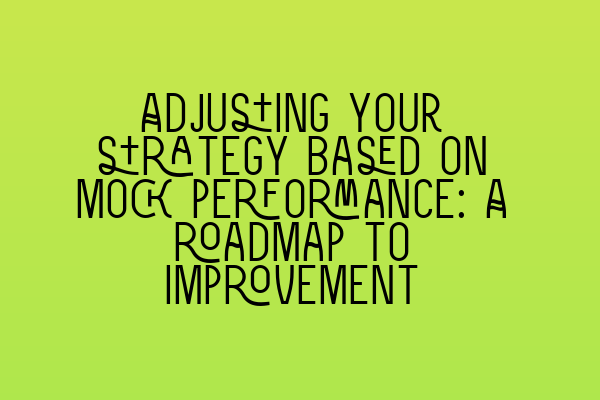Adjusting your Strategy Based on Mock Performance: A Roadmap to Improvement
Why are mock exams important? Well, they serve as valuable tools for assessing your knowledge, identifying areas of weakness, and honing your exam-taking skills. Mock exams simulate the real exam experience, giving you a chance to practice under timed conditions and familiarize yourself with the format and type of questions you will encounter.
The results of mock exams can provide crucial insights into your current level of preparedness and help you make necessary adjustments to your study strategy. In this blog post, we will discuss how you can analyze and leverage your mock exam performance to maximize your chances of success on the actual SQE exam.
1. Analyzing Your Mock Exam Performance
After taking a mock exam, it’s important to dig deep into your performance to identify your strengths and weaknesses. Start by reviewing the questions you struggled with, noting any recurring themes or topics that you consistently struggled to answer correctly. This analysis will help you prioritize your study efforts and allocate more time to areas that need improvement.
2. Identify Knowledge Gaps
One of the main purposes of mock exams is to identify knowledge gaps. Pay close attention to the questions you answered incorrectly or left unanswered. These are areas where you may lack a solid understanding of the material or need to refresh your memory. Once you identify these knowledge gaps, refer back to your study materials or seek additional resources to fill in the missing information.
3. Adjust Your Study Plan
Based on your performance in the mock exams, it’s essential to make adjustments to your study plan. Focus more on the topics and concepts that you struggled with, allocating additional time for in-depth study and practice. Consider revisiting relevant articles or study guides, like “Legal Considerations in Residential Leases: Essential Insights for Solicitors” and “Understanding Planning Permission and Land Use: Key Considerations for Legal Professionals,” which can provide valuable insights into specific legal areas.
4. Refine Time Management Skills
Mock exams also help you assess your time management skills. Did you struggle to complete the exam within the given time frame? Were you able to effectively manage your time across different sections? Pay attention to these aspects and practice pacing yourself during future mock exams. Efficient time management will be crucial during the actual exam to ensure you have enough time to answer all the questions.
5. Take Advantage of MCQ Strategies
The SQE exam heavily relies on multiple-choice questions (MCQs). Sharpening your MCQ skills can significantly improve your chances of success. Refer to the article “MCQ Strategies for SQE Property Practice: Tips for Exam Success” for valuable tips and techniques to tackle MCQs effectively. Understanding the reasoning behind the correct answers and common traps can enhance your ability to select the right option.
6. Seek Feedback and Guidance
Mock exams provide an opportunity for feedback and guidance from experienced professionals. Consider seeking input from tutors or fellow students who have already taken the SQE exam or have expertise in the subject matter. Their insights can offer a fresh perspective and help you refine your study approach.
7. Don’t Neglect Legal Considerations
Within the Property Practice area, legal considerations are crucial. Familiarize yourself with concepts such as freehold vs leasehold, land charges, and other related topics. This article on “Freehold vs Leasehold: Understanding the Differences” and “Land Charges: Understanding and Managing Encumbrances” can provide you with a deeper understanding of these essential legal aspects.
In conclusion, mock exams are invaluable tools to assess your knowledge, identify areas of weakness, and adjust your study strategy. Analyzing your performance, identifying knowledge gaps, refining time management skills, and leveraging helpful resources like related articles can significantly enhance your exam preparation. Stay focused, adapt your strategy as needed, and strive for improvement. Good luck on your journey to SQE success!
Sources:
– Legal Considerations in Residential Leases: Essential Insights for Solicitors
– Freehold vs Leasehold: Understanding the Differences
– Understanding Planning Permission and Land Use: Key Considerations for Legal Professionals
– Land Charges: Understanding and Managing Encumbrances
– MCQ Strategies for SQE Property Practice: Tips for Exam Success

Leave a Reply